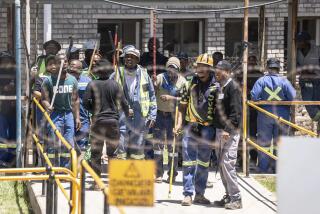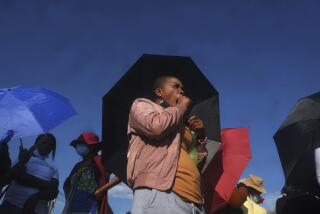S. Africa’s 3-Week Blockade of Lesotho Lifted as Rebels Leave
JOHANNESBURG, South Africa — This country lifted its three-week blockade of Lesotho on Saturday shortly after members of the African National Congress began leaving the small mountain kingdom.
Trucks and railroad cars full of food, fuel, consumer goods and raw materials began to cross the border into Lesotho as the first two planeloads of congress members, 87 in all, flew out of Maseru, the kingdom’s capital, for Zambia and Tanzania.
No effort was made to disguise the nature of the bargain that Lesotho, surrounded by South Africa and economically dependent on it, was forced to strike with the minority white government in Pretoria.
Foreign Minister Roelof F. (Pik) Botha of South African said in Cape Town that in a week of talks his government had concluded what amounts to a security pact with Lesotho’s new military rulers, who came to power in a coup last Monday, and as a result it was ending the blockade that threatened to strangle the little country.
Even before Botha spoke, traffic had begun to flow normally from South Africa into Lesotho, a country about the size of Maryland with a population of 1.5 million. Crowds in Maseru cheered the convoys of arriving trucks.
Botha later warned Botswana, one of South Africa’s northern neighbors, that it, too, faces “action,” perhaps economic sanctions such as those used on Lesotho but perhaps commando raids, if it allows African National Congress guerrillas to continue using its territory to cross into South Africa.
Under its agreement with Pretoria, Lesotho will send active members of the African National Congress and their families to new countries of asylum, according to Western diplomats in Maseru, but not deport them back to South Africa as originally demanded. It will also not allow new refugees coming from South Africa to remain in large numbers, the diplomats said.
Altogether, about 11,000 South Africans, most of them refugees from apartheid, live in Lesotho, according to government sources in Maseru. However, only a few hundred are active in the African National Congress, and many hold key jobs in the Lesotho economy.
More to Read
Sign up for Essential California
The most important California stories and recommendations in your inbox every morning.
You may occasionally receive promotional content from the Los Angeles Times.










